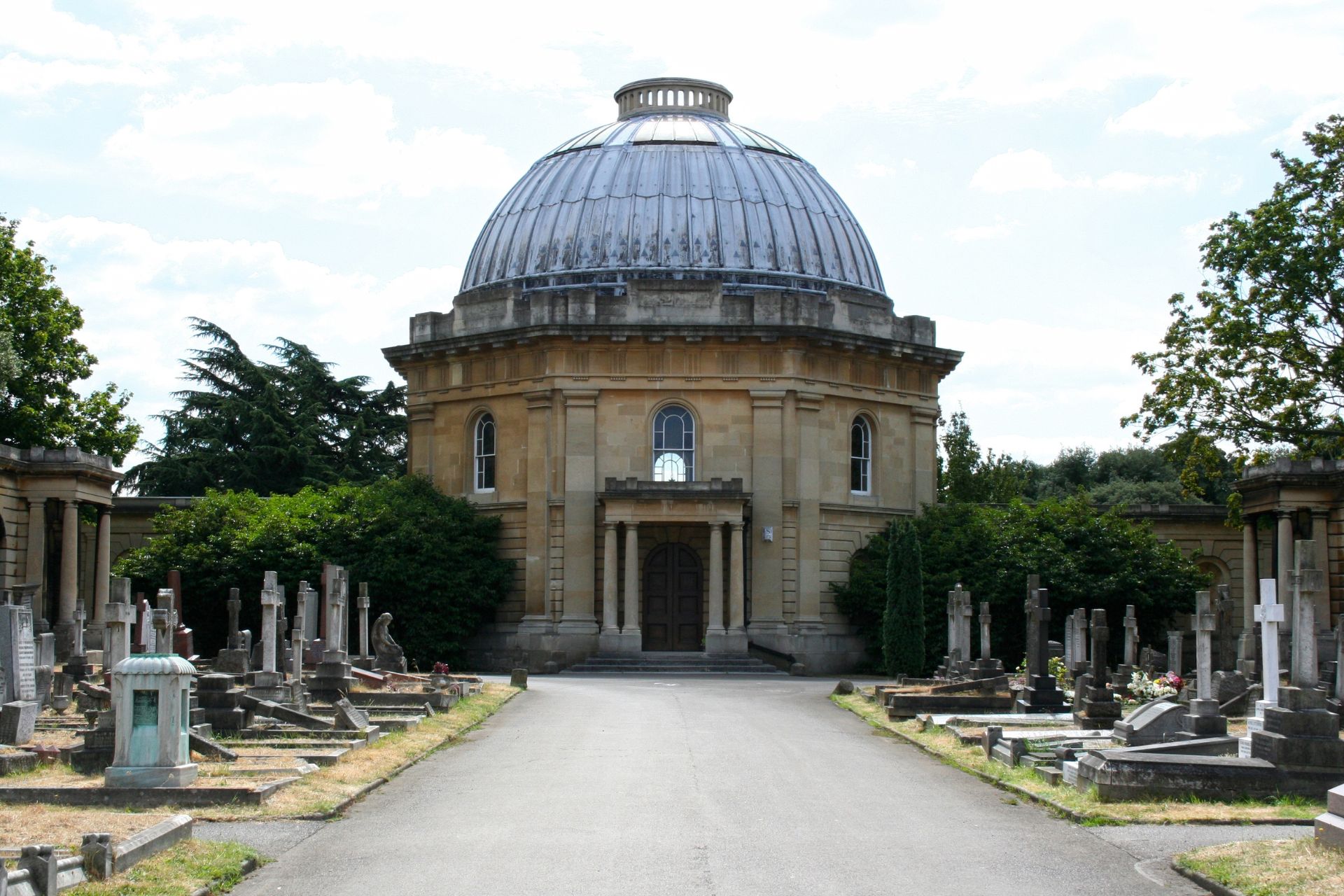Something to consider when reading/listening: To what extent does your job define who you are?
I always enjoy a good graveyard. I do.
I like people, you see. But I abhor small talk. So graveyards are perfect. We all hate small talk, don’t we? What’s the one question everyone hates but no one can help asking? Go on, what is it? “What do you do?” That’s the bugger. That’s a twisted bollock of a question, ain’t it? “What do you do?” What’s it to you? I’m one of those people for whom a job is just a job, thank you very much. Had a significant career change a while back- it surprised a lot of people- but I’m still the same person I was then. That’s the best thing about graveyards. Thousands of headstones. All sorts of shapes, all sorts of dates and guess what…? Not a single one of them has been inscribed with the person’s job. There’s a lesson in there, I’m telling ya. There’s a lot of important people buried in this graveyard ’n’ all. If you google “famous people Brompton Cemetery” you’ll get a list of writers, actors, naval officers, architects, artists. But when they die, they prefer to be known as “fathers,” “mothers,” “husbands,” “wives.” Some are happy just with their name and dates, although you can’t always read them. Most of the graves are more than a hundred years old and they’re faded and subsided. Cracked and crumbled. There are signs asking for support with the upkeep and you can tell they need it. Thirty-nine acres it is. A huge space packed tight with graves, very little room for new ones. Not that it’s always so quiet here, mind. That’s Stamford Bridge over there. Right next door. On match days, you’ll get thousands of people streaming through, waving their scarves and cans of beer. And when Chelsea score a goal I’d imagine it rattles a few bones. Strange though, don’t you think, to have something as alive as a football stadium next to something as dead as a cemetery? And all the money Chelsea have as well, while this place is falling into ruin, crying out for donations. It’s obvious what should be done, ain’t it? I can’t be the only one who thinks it. They should flatten Brompton Cemetery and use the space to build Chelsea a new stadium. Come on, you’ve got a 42,000 capacity for a team with two European Cups and fans all over the world. And when they talk about expanding, it’s only by ten or so thousand and the club will have to find somewhere else to play while the work is taking place. No, it’s ridiculous. They’ve got this enormous site right next door, 39 acres of land. Stamford Bridge is only 12. They could build a stadium with a hundred thousand seats if they wanted, the team could carry on playing at Stamford Bridge until it’s done, and not a single one of the current inhabitants would complain. And best of all, they could call the new stadium The Graveyard. Can you imagine? “Chelsea bury Spurs at the Graveyard.” “The Blues mutilate United at The Graveyard.” “Liverpool’s title hopes turn to dust at The Graveyard.” “Arsenal’s six-foot striker is six foot under at…” Well, you get the point. I bring it up pretty much every match and everyone thinks I’m joking.It’s not a match day today though. It’s a funeral and we’ve come here for the burial. A couple of years younger than me, the geezer, which always makes you think. Not that it should. People a couple of years younger than me have been dying ever since I was a couple of years old, but there you go.
I knew the geezer well enough but I’m more friendly with his brother Joel. He sits in front of me in the Matthew Harding Upper. I’ve told him all about my plans for The Graveyard and I think he’s on board, but I won’t mention it today. He seems to be coping well. In my experience, he knows how to deal with life’s difficulties. When we were robbed by Barcelona in 09, Joel was the calmest fella in the stadium. He was making jokes maybe ten minutes after the full-time whistle. I thought it was a touch insensitive at the time, mind, but, no, it’s a good attitude. He reminds me a bit of that comedian, what’s his name? Iranian fella. Omar Dalaglio? Something like that. He’s a Chelsea fan too, as it happens, I’ve seen him at a few games. The widow is very tasty. I say this simply as an observation. The death of a husband tends to, not always, mind you, but tends to do wonders for a woman’s complexion and body shape. The ten days or so between death and funeral, when they don’t have much of an appetite, it shifts a few pounds which most women of that age could do without. These are just observations. This particular widow, the one who was married to Joel’s dead brother, she’s always looked good. And, maybe I’m imagining things, but I don’t think my admiration is entirely unreciprocated. At her daughter’s wedding, she used her napkin to wipe a bit of cake from the side of my mouth. And we must’ve talked for at least an hour. Just a bit of fun, I’m sure, both of us having a prod at the forbidden fruit. Her daughters, I’m afraid the dad’s passing has done nothing for their figures. One of them’s just given birth so I suppose we’ll let her off but the other one, the one whose wedding it was, that was a few years ago, mind, she’s far too skinny. The pair of them have been clinging to each other all day. They read the eulogy together, they sat together, and now they’re arm in arm like a pair of old ladies. I don’t know what any of these people do for a living and I’m grateful for the ignorance. I know Joel’s a plumber but so what? I know his opinion on every single Chelsea player for the past twenty-six years and that information gives me a much clearer sighting of the man’s soul. I know the deceased was a surgeon but only because it was in the eulogy. I’ve got no idea what the tasty widow does or did and I don’t much care. A job might tell you more about a person, but it can just as easily tell you less.Once we’ve successfully set the coffin into the foundations of Chelsea’s future stadium, we go to a pub called The Rose for the wake. I’m used to being in here before a game when it’s packed and beery and smells oddly like jizz. But today, with a corner roped off for Madeira cake and jam sandwiches, it looks like quite a nice boozer. Still has a bit of a spunky whiff, mind.
And it’s only now, once we’re inside, that I get a proper look at the deceased’s parents. That’s not a nice phrase, is it? “The deceased’s parents.” The old lady looks like she’s had her soul sucked out with a hoover. The old man looks happy enough but that’s because he’s got severe dementia and probably don’t know whose funeral this is. It’s not nice to say it but you’d rather be him today than her. Dementia’s awful don’t get me wrong. But if you have to attend your son’s funeral it’s probably better without your memories. And yet you can tell by the way she holds his hand, the way she feeds him his bit of Madeira cake, the way she brushes the crumbs from his shoulder, you can tell she’s spent the whole day thinking not about herself but about him. And it don’t matter how many times he looks at her like she’s an overfamiliar stranger, she carries on tending to him, making sure he’s ok, putting him first and herself nowhere. He don’t know what she used to do for a living, he might not even know her name, but he does know her kindness. It’s makes you think. Perhaps we should treat everyone we meet as though they’re the love of our life who just can’t remember us.I help myself to a piece of Madeira cake. Ooh, that is good. A thick layer of buttercream on top. I am in heaven. Then I look up and see the tasty widow all by herself in the beer garden, dabbing her eyes with a napkin.
I dip my finger into the buttercream and smear it against the side of my mouth. Then I casually pop outside. As she sees me coming she adjusts her blouse and pushes out her breasts, I’m not imagining it. And why shouldn’t she? The term “widow” tells you no more about a person than “doctor” or “accountant.” It don’t tell you who she is, it don’t tell you nothing about her. As we talk she holds eye contact for the whole time. That’s not normal widow behavior, is it? And she don’t mention her dead husband once. She talks about the church and how calming she found it. Then she mentions the cemetery and how pleased she was to get a spot there. Then she gets her napkin and wipes the buttercream from the side of my mouth while maintaining her unbreakable eye contact. Oh yes, she is definitely flirting with me now. Those eyes, that laugh. Widow or not, this woman can’t help herself. I’ve always loved the Yorkshire accent, and hers seeps into you like a warming cuppa or a shot of whiskey. It lingers at the back of your throat, her pharynx tickling your own. We could talk for years and I’d never ask her what she does for a living. She could have any job in the world and it wouldn’t tell you the first thing about her. She will not be contained by any label. She is wild. She is free. And she is definitely, definitely flirting with me.[Doe Wilmann first released this piece on his short story podcast, Meaningless Problems.]
The views expressed in this article are the author’s own and do not necessarily reflect Fair Observer’s editorial policy.
Support Fair Observer
We rely on your support for our independence, diversity and quality.
For more than 10 years, Fair Observer has been free, fair and independent. No billionaire owns us, no advertisers control us. We are a reader-supported nonprofit. Unlike many other publications, we keep our content free for readers regardless of where they live or whether they can afford to pay. We have no paywalls and no ads.
In the post-truth era of fake news, echo chambers and filter bubbles, we publish a plurality of perspectives from around the world. Anyone can publish with us, but everyone goes through a rigorous editorial process. So, you get fact-checked, well-reasoned content instead of noise.
We publish 2,500+ voices from 90+ countries. We also conduct education and training programs
on subjects ranging from digital media and journalism to writing and critical thinking. This
doesn’t come cheap. Servers, editors, trainers and web developers cost
money.
Please consider supporting us on a regular basis as a recurring donor or a
sustaining member.
Will you support FO’s journalism?
We rely on your support for our independence, diversity and quality.






Comment